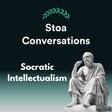
Trolleys, Torture, and Moral Dilemma’s (Episode 180)
Michael and Caleb dive into classic philosophical thought experiments to uncover Stoic solutions to impossible choices. From the infamous Trolley Problem to the Happiness Machine, they examine how Stoicism's focus on virtue, context, and roles provides a unique framework for moral decision-making.
Unlike utilitarian or rule-based ethics, the Stoic approach emphasizes character over consequences, yet remains practical when facing life's hardest choices. This thought-provoking conversation challenges modern assumptions about ethical reasoning while revealing surprising Stoic positions on torture, self-sacrifice, and artificial pleasure.
(01:57) Trolley Problem
(14:35) Do Stoics Endorse Torture?
(20:31) Happiness Machine
(24:24) Utility Monster
(27:14) Euthyphro Dilemma
(35:53) Sinking Ship
(40:59) Prisoner's Dilemma
(46:11) Omelas Child
(53:59) Takeaways
***
Download the Stoa app (it's a free download): https://stoameditation.com/pod
If you try the Stoa app and find it useful, but truly cannot afford it, email us and we'll set you up with a free account.
Listen to more episodes and learn more here: https://stoameditation.com/blog/stoa-conversations/
Thanks to Michael Levy for graciously letting us use his music in the conversations: https://ancientlyre.com/



















